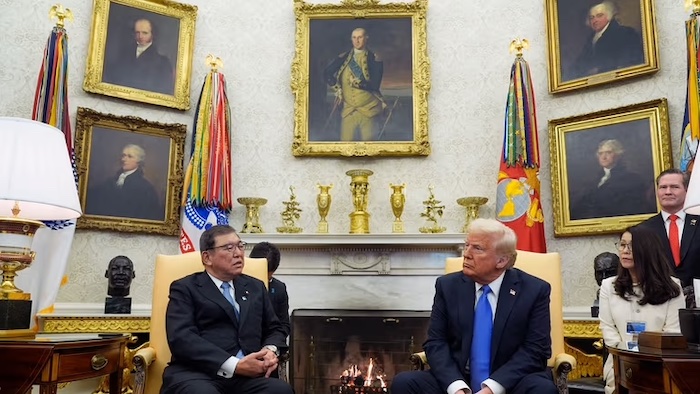
Trump Advances Alaska LNG Project While Speaking with Ishiba of Japan
Trump and Ishiba have talked about the Alaska LNG project, which aims to lessen reliance on imports from the Middle East and increase energy security.
The potential of a decades-old plan to harvest gas from Alaska and transport it to US allies in Asia was highlighted by US President Donald Trump at a recent private meeting with Japanese Premier Shigeru Ishiba.
The plan, which would replace energy imports from the Middle East, was presented by Trump and his energy adviser Doug Burgum as a way for Japan to lessen its dependency on foreign energy sources and balance its trade with the United States.
Ishiba, keen to keep a good diplomatic relationship with Washington and prevent the introduction of US tariffs, stated cautious support for the $44 billion Alaska LNG project, according to two individuals briefed on the discussions.
Ishiba told Trump and Burgum, “I hope Japan can participate in the Alaska LNG project,” despite persistent concerns about its feasibility. But Ishiba did not bring up the project in his public remarks, and the official readout of the discussions did not include it either.
Speaking with more than a dozen US and Asian officials, both past and present, exposed the Trump administration’s larger plan to develop stronger economic relations with East Asia. Expanding US fossil fuel exports, especially liquefied natural gas (LNG), to important regional allies is at the heart of this.
Regarding trade tariffs and the safety of vital marine trade routes, like those in the South China Sea and the Middle East, the US aims to allay Asian worries.
The Alaska LNG idea is still beset by logistical and financial issues, but Asian countries like Japan, South Korea, Taiwan, and others are becoming more interested in buying more US gas, which could boost the US economy and lessen the might of competitors like China and Russia. A key player in this approach is Japan, which is the second-largest LNG customer in the world, an energy infrastructure investor, and a trading hub with access to excess LNG supplies that may help the US export gas to Southeast Asia.
The Hudson Institute’s Japan chair, Kenneth Weinstein, clarified, “If the Trump administration had its way, US LNG would flow in large amounts to South Korea and Japan, and then would flow downstream. in order for Southeast Asia to rely on the US for economic support. The energy dependence map is being redone.
In a joint statement with US Secretary of State Marco Rubio on Saturday, the foreign ministers of South Korea and Japan promised to embrace America’s “affordable and reliable energy,” especially LNG, in order to improve energy security. Nevertheless, the Alaska LNG project was not mentioned in the statement.
“We think the Japanese can play an even bigger role in purchasing America’s abundant oil and gas, and the US produces some of the cleanest LNG in the world,” confirmed White House National Security Council spokeswoman Brian Hughes.
Regarding the Ishiba-Trump encounter, Japan’s foreign ministry chose not to comment. Next month, Japan’s trade minister will travel to Washington to pursue exemptions from US tariffs and talk about expanding Japanese purchases of US LNG.
Difficult terrain and exorbitant costs have stymied the concept of building an 800-mile pipeline from Alaska’s North Slope to an export terminal on the Pacific coast. Japan, meanwhile, had been getting ready to express a provisional endorsement of the proposal in an effort to improve ties with Washington. When Trump and Ishiba met on February 7, the project became a major topic, which surprised the Japanese delegation by taking up so much of the agenda.
At the lunch meeting, U.S. officials urged Japan to think about long-term purchase agreements and investments in Alaska LNG infrastructure.
According to Senator Dan Sullivan of Alaska, the US highlighted the project’s closeness to Japan, emphasizing that supplies would eliminate dependency on Russian gas and avoid delicate choke spots like the South China Sea and the Straits of Hormuz.
Sullivan stated, “Alaska LNG was a big part of the discussion.” “Having a strong and persistent president who dedicated this much time to this project undoubtedly made an impression on the Japanese.”
Maps were even utilized by US officials to highlight the Alaska LNG project’s strategic advantages. The talks were intended to show how the project may improve Japan’s energy security, according to Sullivan.
Japan currently imports about 10% of its LNG from American sources, which is a substantial amount.
Nonetheless, Japan also imports comparable amounts from the Middle East and Russia, while Australia continues to be the biggest provider, making up around 40%.
Over the next five to ten years, when current contracts with suppliers like Russia expire, US LNG imports to Japan might increase to 20% of the total, according to Hiroshi Hashimoto, senior economist at the Institute of Energy Economics in Japan.
The Trump administration’s approach to energy security is gathering momentum throughout Asia despite logistical obstacles, especially given the ongoing concerns over trade tariffs.
Additionally, Taiwan is looking into the prospect of obtaining more US energy, particularly LNG from Alaska, and Indian Prime Minister Narendra Modi has promised to expand domestic gas purchases.
Former senior U.S. energy official Landon Derentz pointed out that Taiwan’s growing reliance on US energy might operate as a warning to China about its possible aggressive regional moves.
“In certain aspects, you’re signing a contract for a security assurance that the United States will act as an advocate in the event of a conflict to ensure that supplies arrive,” he clarified.
Similarly, two South Korean officials said that their country is thinking about investing in US energy projects, including Alaska LNG.
According to one of the officials, the nation expects to obtain trade concessions from the United States in exchange.
Seoul and Washington are discussing methods to improve energy security, according to a spokesman for South Korea’s industries ministry.
Senator Bill Hagerty of Tennessee, a former ambassador to Tokyo, thinks Japan may play a significant role in distributing U.S. LNG.
“America can work very closely with Japan to create the kind of energy security bonds that will be great for our nations’ economies and for our national security,” he added, referring to regions such as Alaska, Louisiana, and Texas.
Although there is still uncertainty around the Alaska LNG project’s future, the Trump administration’s desire for more energy exports to Asia is turning into a key component of its regional economic strategy.
All Categories
Recent Posts
Tags
+13162306000
zoneyetu@yahoo.com


